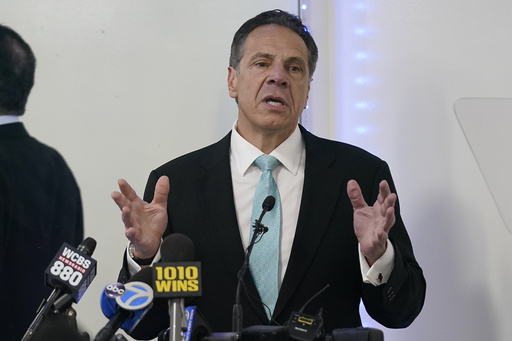ALBANY, N.Y. (AP) — Months after a judge ruled that New York’s ethics watchdog violated the state constitution because it was too independent, a state lawyer told an appeals court that officials had the right to create a corruption-fighting commission more insulated from the people it monitors.
The arguments Friday over the fate of the state Commission on Ethics and Lobbying in Government stem from a lawsuit filed by former Gov. Andrew Cuomo, who claims the commission lacked the constitutional authority to prosecute him. Cuomo, who resigned in 2021, is fighting an attempt by the commission to force him to forfeit $5 million he got for writing a book about his administration’s efforts during the COVID-19 pandemic.
The commission was created in 2022 to investigate potential ethics and lobbying violations by state officials, employees, lobbyists and their clients. The Legislature and Gov. Kathy Hochul replaced a previous ethics body that had been widely criticized for not being independent enough. Under the current commission, the governor appoints only three of the commission’s 11 members, cannot force them to explain their actions and cannot remove them for neglecting their duties.
A lower court judge ruled in September that giving such independent power to the commission makes it a problem under the state constitution, since enforcement of ethics laws is a power that belongs to the executive branch.
The ethics commission has continued to operate while the state appealed to the Appellate Division of the state Supreme Court.
Arguing for the state, attorney Dustin Brockner said the governor and the Legislature have leeway to decide how to regulate their affairs. In this case, the governor found there was little public trust in the previous ethics watchdog because it wasn’t sufficiently insulated from the officials it monitored, including the governor.
“We’re dealing with a unique problem here,” Brockner said. “For years, New York has struggled to create an effective ethics commission. And we’re not talking about regulating the public at large. We’re talking about the political branches deciding how to regulate themselves.”
Brockner argued that the governor maintains “meaningful influence” over the commission.
An attorney for Cuomo told the judges that the goal of the policy might be high-minded, but the question is whether it was constitutional.
“The constitution doesn’t make an exception for the ethics laws. It says the governor is in charge of ensuring that the laws are faithfully executed,” said attorney Gregory J. Dubinsky.
The mid-level appeals court is expected to issue a ruling in the coming months.
Cuomo had also battled the previous commission, the Joint Commission on Public Ethics, over his book earnings. State officials have claimed Cuomo hadn’t kept a promise not to use any state resources on the book, allegations Cuomo has denied.
Cuomo resigned in August 2021 after the attorney general released the results of an investigation that concluded the then-governor had sexually harassed at least 11 women. Cuomo has denied the allegations.


